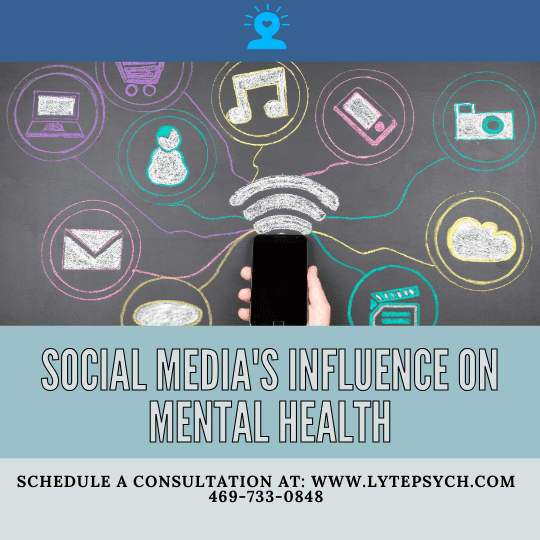Tue Jan 07 2025
Social Media's Influence on Mental Health: Understanding the Digital Landscape at Lyte Psychiatry (Best Therapist and Psychiatrist Near You), Best Adults and Adolescents Therapist and Psychiatrist Near You, Dallas, TX

Social Media's Influence on Mental Health: Navigating the Digital Landscape at Lyte Psychiatry (Affordable Therapist and Psychiatrist Near You)
In today's digital age, social media plays an integral role in how we connect, communicate, and share our lives. While it offers numerous benefits, such as staying in touch with friends and accessing information, social media can also significantly impact mental health. At Lyte Psychiatry in Dallas, TX, we are dedicated to helping individuals understand and navigate the complex relationship between social media and mental health.
The Positive Aspects of Social Media
Connection and Support
Social media platforms can help individuals connect with friends and family, fostering a sense of belonging and community. For those feeling isolated, especially during challenging times, social media can provide vital social support.
The Dangerous Impact of Social Media
Comparison and Self-Esteem Issues
One of the most significant downsides of social media is the tendency to compare oneself to others. Constant exposure to curated and idealized portrayals of others’ lives can lead to feelings of inadequacy, low self-esteem, and dissatisfaction with one’s own life.
Cyberbullying and Harassment
Fear of Missing Out (FOMO)
The phenomenon of FOMO is heightened by social media, as individuals constantly see others participating in activities and events. This can lead to feelings of exclusion and loneliness, further impacting mental health.
Understanding the Digital Landscape: Strategies for Healthy Engagement
Focus on Authentic Connections
Prioritize genuine interactions over quantity. Engage with friends and family in meaningful conversations, whether online or offline. Aim to deepen relationships rather than simply accumulating followers.
Share your experiences and feelings authentically, as this can foster deeper connections and encourage others to do the same.
Seek Professional Support
If social media use is significantly impacting your mental health, consider seeking support from a mental health professional. Therapy can provide valuable tools for managing anxiety, self-esteem issues, and the effects of online interactions.
Seek Professional Support Near You at Lyte Psychiatry (Best Adults and Adolescents Therapist and Psychiatrist Near You)
Social media is a powerful tool that can both positively and negatively influence mental health. By understanding the potential impacts and implementing strategies for healthy engagement, individuals can navigate the digital landscape more effectively. At Lyte Psychiatry in Dallas, TX, we are here to support you on your journey toward mental well-being. If you or someone you know is struggling with the effects of social media on mental health, don’t hesitate to reach out for guidance and support.
To Schedule an Appointment. Click Here
To see our. services. Click Here
Call us if you have questions at 469-733-0848
FAQ
Q: How does social media affect mental health?
A: Social media can impact mental health positively by providing connection and support, but it can also lead to comparison, self-esteem issues, and increased anxiety.
Q: What is FOMO, and how does it relate to social media?
A: Fear of Missing Out (FOMO) is the anxiety of feeling excluded from social events or experiences, which can be exacerbated by seeing others' posts on social media.
Q: Can social media use contribute to mental health disorders?
A: Excessive or negative social media use has been linked to increased rates of anxiety, depression, and low self-esteem, particularly among adolescents and young adults.
Q: How can I limit my negative feelings associated with social media?
A: Setting boundaries, practicing mindfulness, focusing on authentic connections, and curating your feed can help reduce negative feelings related to social media use.
Q: When should I seek professional help regarding social media use?
A: If social media significantly impacts your mental health, leads to anxiety or depression, or interferes with daily activities, consider reaching out to a mental health professional for support.